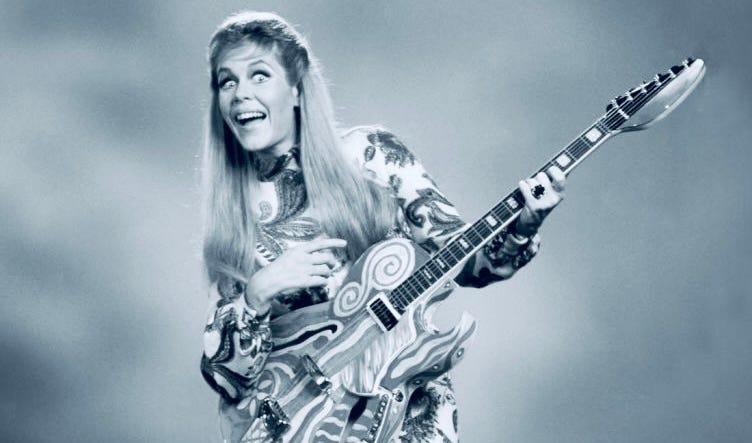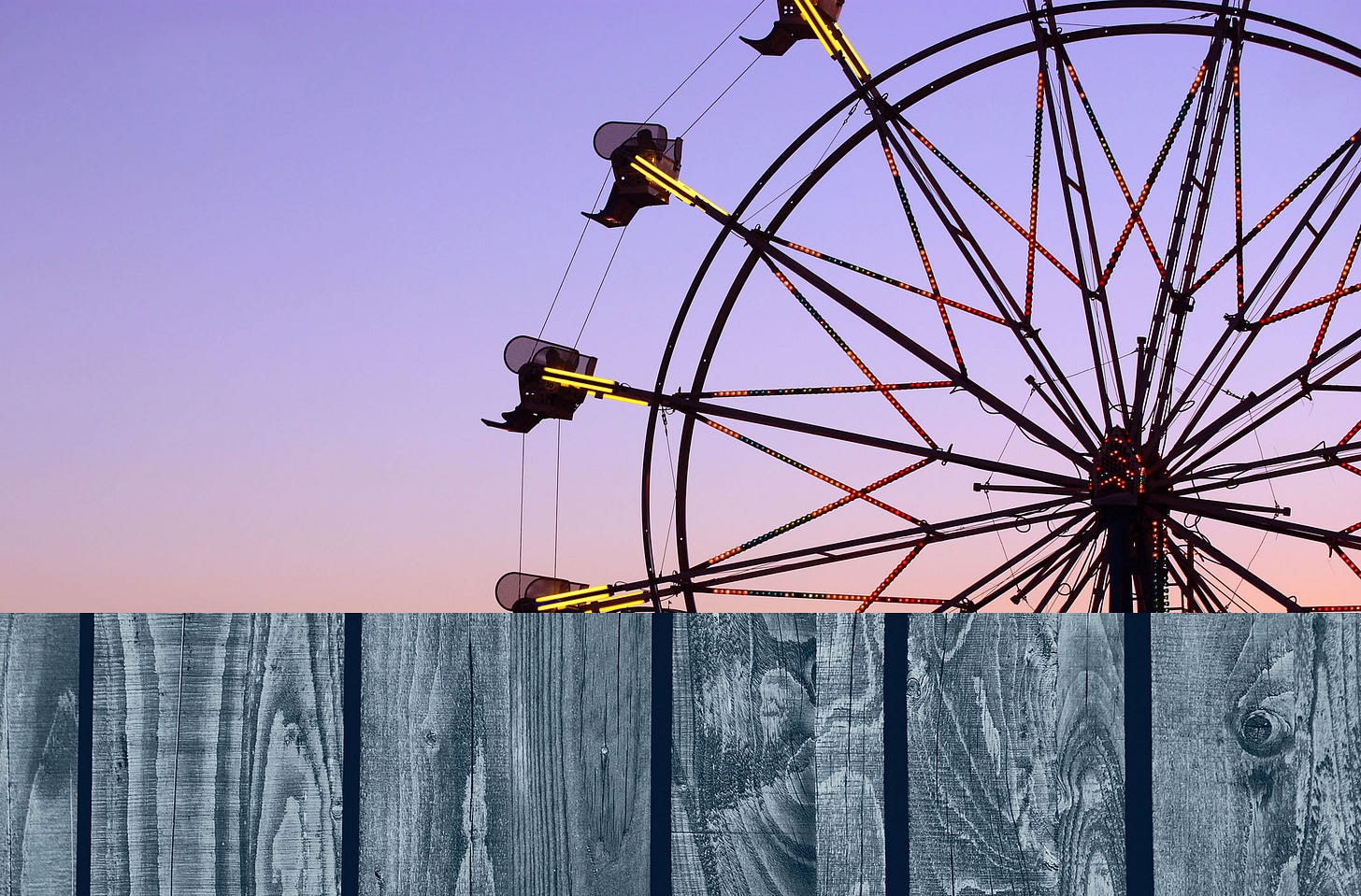The Blues & Billie Armstrong 39
CARNIVAL SOUP
Previously in The Blues & Billie Armstrong…
“Yes, you need your rest,” Darlene said. “Don’t do too much too soon. You’ll have a relapse.”
From behind the newspaper held up in front of his face, my father’s voice said, “You don’t want to miss any more work.”
Later, the parents were watching television, a rerun of Bewitched, the one where naughty cousin Serena turns into a hippie—possibly the corniest hippie ever portrayed—and goes to jail after a riot at a love-in.
I’d seen it before so I went to my room with the idea to re-read something in my U.S. Government textbook.
The light was on in Billie’s room, and I heard voices on the radio, though I couldn’t make out the words. Nate had told us to check out an FM station out of San Francisco, KSAN, which he said was “the first radio station run by hippies.” Real hippies that is, not like Serena on Bewitched. So I tapped on the glass until Billie came to the window and tugged it open.
“Is that the station Nate was talking about?”
“The coolest station in the history of the world,” she said, mocking Nate’s enthusiasm.
“You feeling better?”
“I’ll be okay.” She brought the vanity stool over and sat down, smiled weakly. She seemed smaller than I remembered.
I sat on the floor cross-legged, facing the window. “Ready for the big weekend?” I said.
Memorial Day Weekend was an important milestone on the Lupoyoma calendar, especially for businesses like the Weeping Willow. The unofficial start of summer on the lake, tourist families rolling into town in their campers and station wagons—the lucrative combination of bored children and dads with wallets. All in honor of our fallen soldiers, of course.
“Lots of overtime,” she said. “Might make enough to pay off Sonny’s car.”
“That would be cool. No more hitchhiking, road trips all summer like we said, right?”
“Yeah, sure,” she said, but she looked down at her lap.
The trucks and trailers started rolling into town Friday morning.
A group of them passed me as I walked to school: the snow-cone trailer, the cotton candy trailer, the Tilt-a-Whirl, and then the magnificent and terrifying Zipper, folded up on the back of a truck like a giant moth in cocoon.
That year the Lupoyoma Chamber of Commerce had convinced the Lupoyoma City Council to allow the annual Memorial Day Weekend carnival to set up downtown instead of the usual spot at the fairgrounds out on the west side of town. The two blocks along the front of Library Park would be the midway, and the rides and other attractions would set up on the cross streets.
The Lupoyoma Police Department came out against the plan, with Chief Lloyd Timmons predicting unmanageable chaos, a traffic and parking disaster, and drunken fisticuffs. Which at first sounded entertaining to me. But now, after everything, I wasn’t quite in the same mood about carnivals, Memorial Day, or anything else.
It was evening by the time I got home from work.
The streetlights were blinking on as I hustled up the steps and inside the house.
“You missed dinner,” my father said, peeking out from behind his newspaper. “Did you make deadline?”
I nodded and, seemingly satisfied, he went back to the news.
“I’ll just warm it up,” Darlene said, quickly up from the floral couch and on her way to the kitchen.
Even at the kitchen table, eating Darlene’s terrible hamburger enchiladas, you could hear the rumble-hum of diesel generators and the buzz of chattering people as the carnival came to life.
“This is ridiculous,” my father said. “I can’t hear myself think.”
“Oh, it’s only for a few days,” Darlene said. “I thought you said it would be good for the economy, for the downtown merchants.”
“That was before they set up the damn Ferris Wheel in our backyard for chrissakes.”
I said, “After dinner, I want to go check it out.”
“You have work tomorrow,” he said.
“I won’t be gone long.”
“Waste of time and money if you ask me,” he said.
Then Darlene surprised me. “Michael, try not be such a killjoy for once.”
It surprised him too, and he retreated behind the paper.
The Ferris Wheel was set up in the dirt parking lot of the Lupoyoma Yacht Club, maybe twenty yards on the other side of our fence.
From our back stairs, an ever-revolving half-circle of the lighted spokes and silvery cars loomed over the fence line, climbing out of darkness one car at a time, arcing against the night sky, then disappearing, again and again.
I moved the loose board aside and stepped through the gap in the fence into a maze of wrist-thick cables running along the ground, two humming generators, a small camper trailer, and an old Ford van I thought I recognized. In a sense, I was backstage at the carnival, the nuts and bolts that are always in plain sight but mostly unnoticed because the lights, the music, the talk and laughter and the smell of sugar in the air are so loud and blinding.
“Hey, what’re you doing back there?” A gruff male voice, a silhouette against the light, arms waving, pointing out a path. “Come on out of there. Over this way, that’s right. This area ain’t safe for kids—hey wait a minute.”
It was Garfunkel—or rather, Howie—and now the familiarity of the Ford van made sense. Turned out he’d worked the carnival in his younger days and now he’d hooked up with some old carny friends and hired on as a ride operator. “Time for me to get out of Dodge,” he said. “Might as well get paid for it.”
“Tired of the bullshit, right?” I said.
He nodded. “You wanna ride? First run of the night.”
“Well, I don’t have a ticket.”
“This one’s on me.”
I started to get in line, then I saw Robyn, of all people, about halfway up the line. She said, “You want cuts?”
I hesitated, and she said, “Come on, Archer, I don’t want to ride alone.”
Garfunkel caught this and gave me the well-lookee-here eyebrows and a proceed-this-way sweep of the arm. Then he elbowed me as I went by and kinda whispered, “I’ll stop your car at the top for a few minutes.”
“Um, okay, why?”
“That’s where the girls fall in love, little brother.”
Garfunkel went to work loading the first customers into their cars, and I stood in line next to Robyn, looking down at the dirt, feeling like a stupid kid, thinking the talk we’d had a couple days before had possibly exhausted everything we would ever have to say to each other, the Constitution notwithstanding.
“It’s my favorite ride,” she said. And I finally looked up and noticed she’d kind of dressed up for the night out. White shorts and a pink button-up shirt, the tails tied in a knot below her aspirational breasts, her stomach bared to an extent that would never be allowed at Lupoyoma Junior High. And makeup, which I couldn’t remember seeing on her before. Blush-colored lipstick and a touch of mascara. She had blue blue eyes that seemed to be lit from inside. I’d never noticed she was pretty. Not screamin’ hot like Laurette, or curvy and brash like Billie, or even awkwardly endearing like Alice. Just simple and innocently pretty.
True to his word, Garfunkel stopped the ride as our car reached the apex of the wheel, then took his sweet time unloading and loading other riders and acting busy with the knobs and switches on his control panel.
It was quieter up there a hundred feet in the air, the cacophony of the carnival homogenized into a din. The ride was angled to face the park and the lake; the edge of a full moon just beginning to peek over the distant mountains but the water still blue-black under the night sky, a bruise on the earth. Tiny boat lights flit around on the surface like fireflies. Everything seemed so small and far away—the water, the ground, people talking, laughing, arguing, going.
I asked if there was any news about her brother, and Robyn looked out at the lake. “No, still nothing. It’s been months now.”
A cool wind began to blow in off the water; our car rocked gently and she slid closer to me on the bench seat. She smelled like coconut suntan oil. I wore Levi cutoffs and when her bare leg grazed my bare leg it sparked a tiny static charge.
“It’s nice, isn’t it,” Robyn said. “Up here, for a little while, you’re not part of it all.”
“And when you go back down?” I said.
She mimed a clowny shrug. “Well… then you’re back in the soup.” Which made me smile. It was something we’d all heard Coach Fish say when things went from bad to good to bad again. We didn’t know exactly what it meant or where it came from, but it sounded funny.
I finally apologized for that day I shoved her into the lockers. “I was just mad at everything.”
She nodded thoughtfully. “I know what you mean.”
“Robyn, do you still believe in God?”
She took a breath of night air. “To tell you the truth, I’m not sure anymore. But I wonder, if there’s no God, why do we feel guilt?”
The Blues & Billie Armstrong is a work of fiction. Names, characters, businesses, places, events and incidents in this book are either the product of the author's imagination or used in a fictitious manner. Any resemblance of the fictional characters to actual persons, living or dead, is purely coincidental.
© All Rights Reserved



